译林5AUnit7 At weekends教案
五年级上册英语教案Unit 7 At weekends(Story time)译林版(三起)-2019年精选教学文档

5A Unit 7 At weekends(Story time)一、教学目标:1、能听懂、会读、会说单词、词组at weekends/chat on the Internet/go to the cinema/fly a kite/have a picnic2、能听懂并且理解频率词(always,usually,often,sometimes)的差异3、能听懂、会读、会说句型What d o you d o at weekends? I always/usually/often …at weekends.4、能正确的理解并朗读课文,在教师的引导和帮助下尝试复述课文内容。
二、教学重点:1、能理解和正确朗读课文,尝试复述课文内容。
2、能听懂并且理解频率词(always,usually,often,sometimes)的差异3、能听懂、会读、会说句型What d o you d o at weekends? I always/usually/oftensometimes… at weekends.三、教学难点:1、初步运用本课所学的词汇和句型谈论自己或他人周末的生活2、能听懂并且理解频率词(always,usually,often,sometimes)的差异3、能听懂、会读、会说句型What d o you d o at weekends? I always/usually/oftensometimes… at weekends.四、教学准备:多媒体PPT五、教学过程:Step 1.Lead inT:Today ,there are many new teachers in our class. Let’s welcome them!1.揭题Unit 7 At Weekends.Learn: weekend=Saturday +Sunday the other five days :weekdays How many weekends are there in a month?How many weekends are there in a year?Step 2. Learn to sayT: There are so many weekends in a year, d o you like weekends? I like weekends, Iusually feel relaxed at weekends. I have some pictures of my stud ents’ weekends.1.Show the pictures of my stud ents’ weekends, speak out what they do then ask and answer:What d o they d o at weekends?They usually…2.T: Do you know my weekends? Can you guess? Look at the pictures.a. Show them one by one, present “play with my d og”“visit my parents” “go to the cinema” “chat on the Internet”chat on the WeChat /QQb. T: What d o I d o at weekends?S: You…c..师小结, But how often? Listen! I always… I usually … I often… I sometimes…(师随即板书频率副词)d. Present the learning tips of the adverbs of frequency.3. Let’s talk : What do you d o at weekends? I… (要求学生至少使用两个频率副词) Step 3. Learn Story timeT: Let’s see our ol d friends Su Hai ,Mike and Helen, what d o they d o at weekends?a. Listen and circl e what Su Hai d oes at weekends ?”b. Listen and tick “ what d o Mike and Helen d o at weekends?”Way: 学生回答的同时教师随机在黑板上贴上活动图片。
新译林版英语五年级上册Unit7Atweekends单元整体设计教案

5A Unit 7 At weekends单元整体设计教案I Aims of the unit 单元教学目标(一)知识目标1. 理解、掌握对话内容,能用正确的语音语调朗读对话,并初步表演对话。
2. 能正确运用日常交际用语:What do you do at weekends?I always\usually\often\sometimes . . .3.能听懂、会说、会读单词:at weekends, grandparents, play with, very much, chat, Internet, go to thecinema, a lot, come out, get out.(二)能力目标1. 能运用所学知识,谈论周末的活动2. 会使用always, usually, often和sometimes3. 知道字母s的发音(三)情感目标能够在自由描述自己的周末活动II Aims of per lesson 单课教学目标III Discourses of the unit 单元文本内容Story time:Mike: What do you do at weekends, Su Hai?Su Hai : I usually visit my grandparents. Su Yang and I like playing with their cat Kitty very much. We often have dinner with our grandparents at weekends.Mike: My grandparents live in the UK. I usually chat with them on the Internet at weekends.Su Hai: What does Helen do at weekends?Mike: She always has dancing lessons. She sometimes goes to the cinema with her friends.Su Hai: What about you, Mike?Mike: I usually play football with Liu Tal at weekends. I some times go to the park with my family. We usually fly a kite and have a picnic there.Cartoon time:Billy always watches TV at weekends. He always eats a lot too.Billy: Mmm, nice!It is spring. Sam and Bobby often play basketball.Bobby: Come out and play basketball, Billy!Billy: No. I don’t like playing basketball.Summer comes. Sam and Bobby often go swimming.Sam: Let’s go swimming, Billy!Billy: No. I don’t like swimming.Now it is autumn.Sam: Let’s go and have a picnic, Billy.Billy: Sure! I like picnics!Billy is too fat.Billy: Oh, I can’t get out!IV Aids 教学准备: Discourse , pictures,videoV Teaching procedure of Period 1 分课时教案教学日期__________Teaching procedure of Period 2 分课时教案教学日期__________Teaching procedure of Period 3 分课时教案教学日期__________Teaching procedure of Period 4 分课时教案教学日期__________Teaching procedure of Period 5 分课时教案教学日期__________Teaching procedure of Period 6分课时教案教学日期__________Teaching procedure of Period 7分课时教案教学日期__________Teaching procedure of Period 8分课时教案教学日期__________。
译林版五年级英语上册第七单元At weekends教案
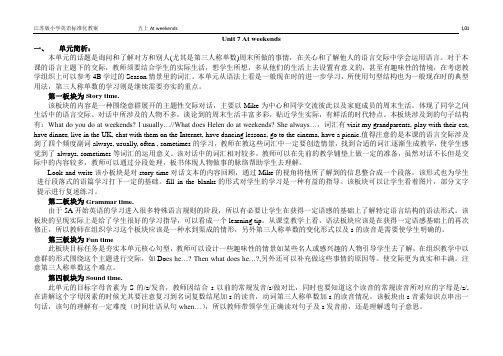
Unit 7 At weekends一、单元简析:本单元的话题是询问和了解对方和别人(尤其是第三人称单数)周末所做的事情,在关心和了解他人的语言交际中学会运用语言。
对于本课的语言主题下的交际,教师须要结合学生的实际生活,想学生所想,多从他们的生活上去设置有意义的,甚至有趣味性的情境,在考虑教学组织上可以参考4B学过的Season情景里的词汇。
本单元从语法上看是一般现在时的进一步学习,所使用句型结构也为一般现在时的典型用法,第三人称单数的学习则是继续需要夯实的重点。
第一板块为Story time.该板块的内容是一种围绕意群展开的主题性交际对话,主要以Mike为中心和同学交流彼此以及家庭成员的周末生活,体现了同学之间生活中的语言交际。
对话中所涉及的人物不多,谈论到的周末生活丰富多彩,贴近学生实际,有鲜活的时代特点。
本板块涉及到的句子结构有:What do you do at weekends? I usually…//What does Helen do at weekends?She always…,词汇有visit my grandparents, play with their cat, have dinner, live in the UK, chat with them on the Internet, have dancing lessons, go to the cinema, have a picnic.值得注意的是本课的语言交际涉及到了四个频度副词always, usually, often , sometimes的学习,教师在教这些词汇中一定要创造情景,找到合适的词汇逐渐生成教学,使学生感觉到了always, sometimes等词汇的运用意义。
该对话中的词汇相对较多,教师可以在先前的教学铺垫上做一定的准备,虽然对话不长但是交际中的内容较多,教师可以通过分段处理,板书体现人物做事的脉络帮助学生去理解。
译林版(三起)五年级英语上册Unit7At weekends Storytime教案

译林版(三起)五年级英语上册Unit7At weekends Storytime教案教学目标通过本节课的学习,学生能够:1.熟练运用本单元所学的词汇和句型,描述周末的活动;2.理解并朗读Storytime中的故事《My Weekend》;3.学习并掌握一些日常用语,如问候和告别语。
教学重点1.理解Storytime中的故事《My Weekend》;2.运用所学的词汇和句型,描述周末的活动。
教学难点1.学生们对于Storytime中的生词和难句理解的难度;2.学生们能否在口语和书写中正确地使用所学的日常用语。
教学准备1.课件;2.PPT幻灯片;3.课本;4.小白板。
教学过程导入新课(5分钟)1.老师出示课件,采用图片的形式出示一些周末活动,与学生们进行互动交流;2.引导学生们讲述自己的周末经历,运用所学的表达方式进行描述。
学习Storytime《My Weekend》(10分钟)1.在课件上出示学生们所熟悉的 Storytime,先快速翻阅故事,询问学生们对于这个故事的看法;2.老师读出故事中的生词和难句,帮助学生们理解故事;3.学生们边听边跟读 Storytime,以便更好地理解并掌握生词。
学生朗读Storytime《My Weekend》(10分钟)1.将故事分成若干小段,每小段约三到四句话,由学生们进行分段朗读;2.学生们根据老师的要求表演故事中所描述的情节;3.老师及时纠正学生们的读音、语音语调等问题。
学习常用日常用语(10分钟)1.将一些日常用语放在课件上,如问候语、告别语等,让学生们进行学习掌握;2.老师通过互动的形式,让学生们更好地理解并使用这些日常用语。
词汇和语法的讲解(15分钟)1.老师出示本单元的词汇表,并逐一讲解每个单词的意义和用法;2.老师讲解本单元的语法考点,例如本单元重点讲述了一般现在时的使用方式;练习及巩固(20分钟)1.在小白板上提供一些问题和情境,帮助学生们灵活地运用所学的语言知识,进行对话和交流;2.老师对于学生们的表现进行点评和反馈,以便更好地帮助他们加强记忆和巩固所学知识。
五年级上册英语教案-Unit7 At weekends Story time |译林版(三起)

3.Watch and answer看动画,思考问题?
Who?
What?
Whose ?பைடு நூலகம்
4. Listen and finish
What do you do at weekends,SuHai?
Tips:1.Read and underline.
阅读课文,用横线划出他们在周末所做的事情的短语。
一、教学内容
译林英语5AUnit7
二、教学目标:
(一)知识目标:
1.学生能听懂,会说,会读词汇和动词短语:chat on the Internet, fly a kite, go to the cinema, have a picnic, visit one’s grandparents, at weekends, usually, often, always, sometimes等。
3.语篇的整体理解和信息获取。
四、教学准备:
课件、磁带、录音机。
主备
教师修改建议
Step 1Warming-up
1.Daily report
2. Enjoy a song.
(PPT: weekend = Saturday and Sunday)
揭题:Unit 7 At weekends
Step 2Presentation
Read together.(齐读)
Read in roles.(分角色读)
Read in groups.(小组读)
Step 3 Consolidation
1.Let’s report!模仿Helen介绍她的周末吧!
模仿Mike介绍他的周末吧
2.Play a game
译林5A Unit7 At weekends 教案
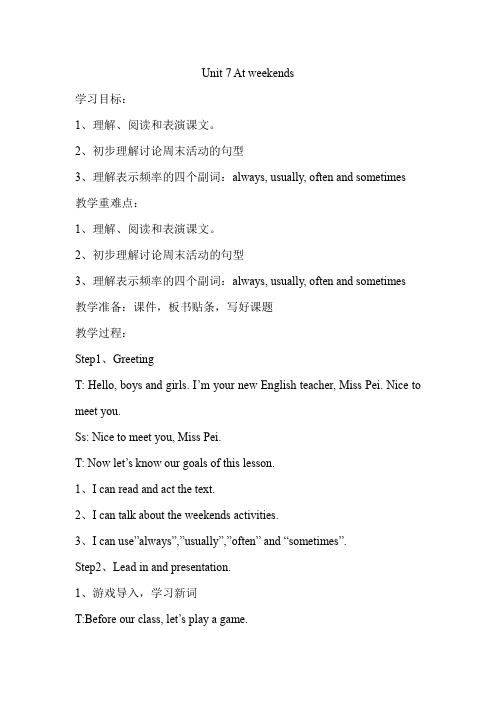
Unit 7 At weekends学习目标:1、理解、阅读和表演课文。
2、初步理解讨论周末活动的句型3、理解表示频率的四个副词:always, usually, often and sometimes教学重难点:1、理解、阅读和表演课文。
2、初步理解讨论周末活动的句型3、理解表示频率的四个副词:always, usually, often and sometimes教学准备:课件,板书贴条,写好课题教学过程:Step1、GreetingT: Hello, boys and girls. I’m your new English teacher, Miss Pei. Nice to meet you.Ss: Nice to meet you, Miss Pei.T: Now let’s know our goals of this lesson.1、I can read and act the text.2、I can talk about the weekends activities.3、I can use”always”,”usually”,”often” and “sometimes”.Step2、Lead in and presentation.1、游戏导入,学习新词T:Before our class, let’s play a game.看到词组和图片就大声说出词组,看到就拍手(复习一些活动类词组)T:教授最后出现的fly a kite.Ss: 跟读两遍T: I usually fly a kite at weekends. Weekend means Saturday and Sunday. Ss: Weekend, weekend.T: Today we learn Unit 7 At weekends.生跟读课题T: I usually fly a kite at weekends. What about you? Can you read these pictures?一生领读,其他跟读。
五年级上册英语教案 Unit 7 At weekends 第四课时 译林版

五年级上册英语教案 Unit 7 At weekends 第四课时译林版教学目标1.能够听懂、认读并会使用本课时所涉及的单词和短语;2.能够运用所学语言描述自己和他人在周末所做的活动,并能够就这些活动进行简单的询问和回答;3.能够结合所学语言简单地写出一个周末日程。
教学重点1.阅读和理解本课时的短文,识别并掌握相关的单词和短语;2.运用所学语言描述自己和他人在周末所做的活动;3.通过简单的练习和交流提高学生的口语能力。
教学难点1.练习和提高学生的口语表达能力;2.教会学生如何用所学语言描述自己和他人在周末所做的活动。
教学过程Warm-up活动1.制作一个课程表,让学生认识活动的时间顺序和活动名称;2.帮学生准备单词卡片,让学生完成与周末活动相关的单词和短语的背诵。
Step 1 复习复习上一课时所学的内容,包括用英语形容天气和个人居住地的位置。
Step 2 - Presentation1.准备好本课时的短文,并让学生跟随教师一起朗读;2.分组阅读,让学生更好地理解并掌握文章的内容;3.引导学生分享他们的理解和心得,并让他们尝试用自己的语言来描述他们所做的活动。
Step 3 - Practice1.让学生结对进行语言对话练习,询问和回答自己周末所做的活动;2.添加一些问题来增加交流的难度,例如询问对方是否喜欢这些活动,是否经常做这些活动等;3.让学生根据自己的日程表写出一个周末计划,并与同桌分享。
Step 4 - Production让学生按照所学模板,用英语写出一个简单的周末计划安排,并让学生在小组间交流。
Step 5 - Summary1.通过本节课程,学生已掌握了一些描述活动的单词和短语,并可以用简单的英语交流自己对周末活动的喜好;2.通过本节课的练习,学生已经提高了他们的口语表达能力,并可以用所学语言描述自己和他人在周末所做的活动。
Homework要求学生在家里根据自己的所做的活动为题,并用英语写下一篇日记,记录自己在周末的所见所闻。
译林版小学五年级英语上册教案Unit 7 At weekends_教案5
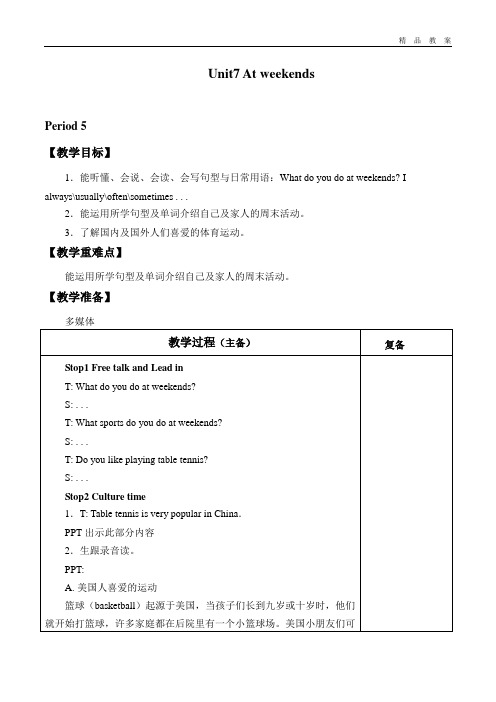
S: . . .
T: What does your father do at weekends?
S: . . .
T: Does your . . . at weekends?
S: . . .
T: How about . . .?
S: . . .
T: Can you introduce yourself like this?
学生练说,然后指名说。
(2)生将自己说的内容写下来。
Step3Exercise
1.Look and say.
2.Read and write.
Step4Homework
1.上网查找其他一些国家人们喜欢的运动。
2.做《练习与测试》上的本单元测试。
T: Now you talk about your family weekends with your partner, OK?
(2)学生同桌讨论。(3来自指名汇报。(4)让学生将自己讨论的内容写下来。
2.I can use “always”,“usually”,“often”and“sometimes”.
【教学重难点】
能运用所学句型及单词介绍自己及家人的周末活动。
【教学准备】
多媒体
教学过程(主备)
复备
Stop1Free talk and Lead in
T: What do you do at weekends?
S: . . .
T: What sports do you do at weekends?
Unit7 At weekends
Period 5
【教学目标】
译林版(三起)五年级上册英语Unit7 At weekends(Sound time,Cartoon time,picture book) 教案
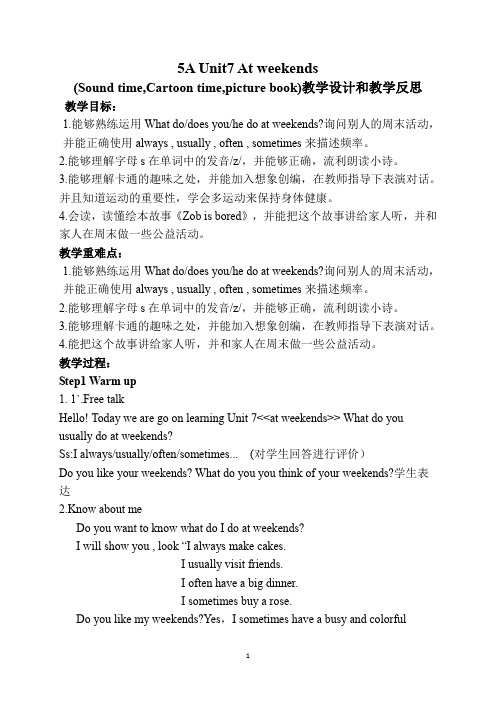
5A Unit7 At weekends(Sound time,Cartoon time,picture book)教学设计和教学反思教学目标:1.能够熟练运用What do/does you/he do at weekends?询问别人的周末活动,并能正确使用always , usually , often , sometimes来描述频率。
2.能够理解字母s在单词中的发音/z/,并能够正确,流利朗读小诗。
3.能够理解卡通的趣味之处,并能加入想象创编,在教师指导下表演对话。
并且知道运动的重要性,学会多运动来保持身体健康。
4.会读,读懂绘本故事《Zob is bored》,并能把这个故事讲给家人听,并和家人在周末做一些公益活动。
教学重难点:1.能够熟练运用What do/does you/he do at weekends?询问别人的周末活动,并能正确使用always , usually , often , sometimes来描述频率。
2.能够理解字母s在单词中的发音/z/,并能够正确,流利朗读小诗。
3.能够理解卡通的趣味之处,并能加入想象创编,在教师指导下表演对话。
4.能把这个故事讲给家人听,并和家人在周末做一些公益活动。
教学过程:Step1 Warm up1. 1`.Free talkHello! Today we are go on learning Unit 7<<at weekends>> What do you usually do at weekends?Ss:I always/usually/often/sometimes... (对学生回答进行评价)Do you like your weekends? What do you you think of your weekends?学生表达2.Know about meDo you want to know what do I do at weekends?I will show you , look “I always make cakes.I usually visit friends.I often have a big dinner.I sometimes buy a rose.Do you like my weekends?Yes,I sometimes have a busy and colorfulweekends.Step 2. Sound time(1.)Mr. Rose.Sometimes, I buy a rose at weekends. Do you like the rose? It’s so lovely!Here’s a big garden. There are many roses in it? Are they lovely?Ss: Yes!The garden belongs to a man. He likes roses too, Do you know who is he?------Mr. Rose!(2.)What does Mr.Rose do at weekends?-------Let’s visit Mr. Rose!(3.)Read and thinkRead after tape. Read by themselves,read in teamsDo you like Mr Rose’s weekends,why?------beautiful,lovely...Look at these red letters, what is the pronunciation of s here?/z/(4.)Say more wordsRead these words,do they pronounce/z/ Ss: /s/(5)Put right words into the sentence. Who is he? 导入到cartoon time 的BillyStep 3. Cartoon time(1.)Watch and answerNow you can watch a cartoon of Billy’s weekends and tell me Do you like Billy’s weekends?why? He always watches TV and eats a lot.(2.)What about Bobby and Sam? Do you like their weekends? Why?(3.) Let’s read(4.)Whose weekends do you like better? Why?Why don’t you like Billy’s weekends?It’s unhealthy and lazy. And Billy becomes fatter and fatter. So at last,(放录音)教学get out让学生模仿读(5.) Suggestions for Billy(6)Let’s act动作,表情,道具(7)we should do sports to keep fit.提升Step 4. Picture bookHere’s a new friend. He is Zob. let’s have a look at his weekend.(1.) What do you know from the cover??What to you want to know about the story?Let the students ask some questions.(2.) Why is Zob bored?Read the story by yourself quickly.快速读故事,找出答案If you have some new words,遇到不会的单词ask your parteners or ask me.问问同桌或者老师。
译林版(三起)五年级上册英语Unit7 At weekends Story time教案

5A Unit 7 At weekends 第一课时教学设计Ⅰ背景信息材料分析:本节课的学习内容贴合学生的真实生活,能激发学生了解的好奇心和兴趣。
学情分析:学生在三、四年级已经学过一些活动类短语,比如踢足球之类,为今天的学习打下了基础。
Ⅱ授课类型:ReadingⅢ教学目标通过本课的学习,学生能够:1.很好的理解、掌握单词和句型。
2.通过细读获取文本的详细信息。
3.讨论自己和他人的周末活动。
4.体验与他人在小组中合作的快乐。
Ⅳ教学重难点1.通过细读获取文本的详细信息。
2.讨论自己和他人的周末活动。
Ⅴ教学准备多媒体、短语卡片、人物图片Ⅵ教学过程Step 1 Warming up and lead in1. Sing a songT: OK. Let’s begin our class. Are you ready? I’m so happy to have classes for you here. First, let’s sing a song. Stand up, just follow me and try to copy me, OK? Don’t be shy, just relax!P: OK.The teacher sings the song and do the action.T:Wow, you are so wonderful today. Thank you, sit down, please.Step2 Pre-reading1. Elicit the topicT: Well, I know you go to school from Monday to Friday, yes, but do you go to school on Saturdays and Sundays?P: No.T: Yes, me too. Do you know, Saturday and Sunday, we can call them, weekend. And look! I can divide this word into two words——this is “week”and this is “end”.What does the end mean? Do a choice, please. A or B?P: A.T: Yes, bingo,you are right,so weekend is the end of a week. Pay attention: ds, we pronounce: “z”, follow me, z, z, weekends, weekends, and this is our topic today: at weekends,at weekends.2. Clear the goals of this lessonT: OK. Look! This class we will talk about my weekends,four kids’ weekends. Four kids, who are they? Don’t worry, we’ll meet them later. And we’ll talk about your weekends. Are you clear?P: Yes.3. Talk about the teacher’s weekends.T: Oh, look, who is she?P: Miss Yang.T: Yes, it’s me! My English name is Joy, so you can call me Joy. Now I will introduce my weekends to you. Listen carefully. I always read books at weekends. I usually watch TV at home. I often go to the cinema with my friends. And I sometimes chat on the Internet at weekends. OK. Look at these four words. Follow me. Always means…P: 总是…4. Different the four words: always, sometimes, often, usuallyT: OK. I put the four words here. Look, I have some stars, if I give “always” five stars,how many stars do you want to give for “usually”? You please.P: Four stars.T: Thank you. You are right. How about “often” ? Have a try.T: Thank you. Do you agree?P: Yes.T: Very good! “Sometimes”? How many stars? Give you a chance, please.P: Two stars.T: Boys and girls, do you agree with her? Good job!5. Play a game to checkT: OK. Boys and girls, you know my weekends, but do you know my weekends well? Let’s check. Look! Rules: If the sentence is true, you say “Yeah! Yeah! Yeah!”, if the sentence is false, you say “No! No! No!”, OK?P: OK!…T: Great! Joy often goes to the cinema at weekends. What does the “cinema” mean?P: 电影院。
五年级上册英语教案-Unit7 At weekends Story time |译林版(三起)
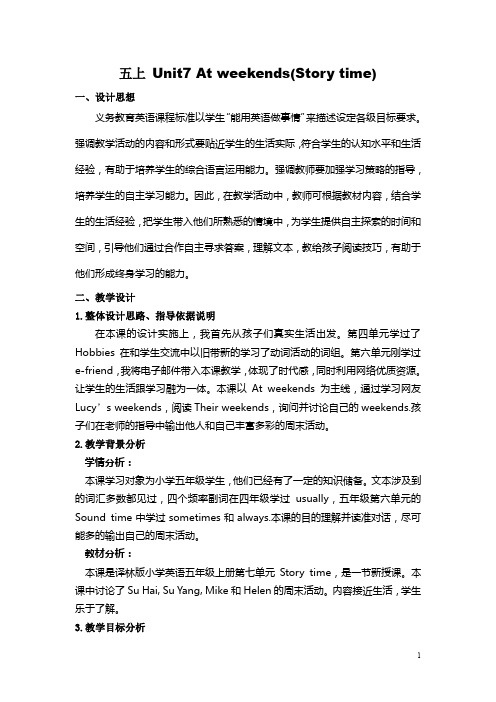
五上Unit7 At weekends(Story time)一、设计思想义务教育英语课程标准以学生“能用英语做事情”来描述设定各级目标要求。
强调教学活动的内容和形式要贴近学生的生活实际,符合学生的认知水平和生活经验,有助于培养学生的综合语言运用能力。
强调教师要加强学习策略的指导,培养学生的自主学习能力。
因此,在教学活动中,教师可根据教材内容,结合学生的生活经验,把学生带入他们所熟悉的情境中,为学生提供自主探索的时间和空间,引导他们通过合作自主寻求答案,理解文本,教给孩子阅读技巧,有助于他们形成终身学习的能力。
二、教学设计1.整体设计思路、指导依据说明在本课的设计实施上,我首先从孩子们真实生活出发。
第四单元学过了Hobbies在和学生交流中以旧带新的学习了动词活动的词组。
第六单元刚学过e-friend,我将电子邮件带入本课教学,体现了时代感,同时利用网络优质资源。
让学生的生活跟学习融为一体。
本课以At weekends为主线,通过学习网友Lucy’s weekends,阅读Their weekends,询问并讨论自己的weekends.孩子们在老师的指导中输出他人和自己丰富多彩的周末活动。
2.教学背景分析学情分析:本课学习对象为小学五年级学生,他们已经有了一定的知识储备。
文本涉及到的词汇多数都见过,四个频率副词在四年级学过usually,五年级第六单元的Sound time中学过sometimes和always.本课的目的理解并读准对话,尽可能多的输出自己的周末活动。
教材分析:本课是译林版小学英语五年级上册第七单元Story time,是一节新授课。
本课中讨论了Su Hai, Su Yang, Mike和Helen的周末活动。
内容接近生活,学生乐于了解。
3.教学目标分析语言知识技能目标:●通过本课学习学生能初步理解、掌握课文,并尝试复述课文。
●学生能听懂、会说、会读下列句型:What do you do at weekends? What does she do at weekends? 并能用重点句型I... 描述自己和他人的暑假生活。
译林版(三起)五年级上册英语教案Unit7 At weekends Fun time

5A Unit 7 At weekends(Grammar time and Cartoon time)【教材分析】Grammar time:通过图片、文字和操练,帮助学生巩固语法知识。
Cartoon time: 通过趣味卡通故事,帮助学生强化语言知识,训练语言技能,着重培养学生的阅读理解能力。
【学习目标】1.词汇always,usually,often,sometimes频率副词的区分和正确用法。
2.句型What do you do at weekends?Ialways/usually/often/sometimes…What does he/she do at weekends?He/she…What do they do at weekends?They…的使用4.能正确理解、朗读Cartoon time中的故事,能读懂其中的趣味之处,能在教师的指导下表演故事。
5.情意目标:让学生感受健康生活方式的重要性。
【教学难点】1. 句型What do you do at weekends?I always/usually/often/sometimes…What does he/she do at weekends?He/she…What do they do at weekends?They…的使用2.能正确理解、朗读Cartoon time中的故事,能读懂其中的趣味之处,能在教师的指导下表演故事。
【教学过程】Step1:Revision.1.Free talk:T: Hello,I’m Miss Fan. Nice to meet you. S:Nice to meet you,too.T: Do you know what day is it today? S:Wednesday.T: Yes,today is Wednesday. We’re going to spend weekends on Sat. and Fri.Do you like weekends?Ok,Let’s talk about your weekends.揭题:Unit7 At weekends2. Review “What do you do at weekends?”及其回答(承上)第一步:T: What do you do at weekends?S1: I...T: What do you do at weekends?S2: I...第二步:PPT出示句型T带领学生齐读一遍What do you do at weekends?第三步:T开始了解学生周末活动T问,S用上两句回答。
五年级上册英语教案Unit7Atweekends译林版
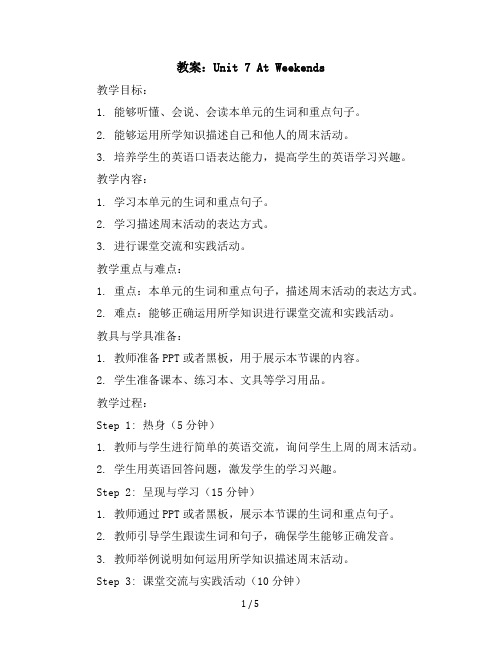
教案:Unit 7 At Weekends教学目标:1. 能够听懂、会说、会读本单元的生词和重点句子。
2. 能够运用所学知识描述自己和他人的周末活动。
3. 培养学生的英语口语表达能力,提高学生的英语学习兴趣。
教学内容:1. 学习本单元的生词和重点句子。
2. 学习描述周末活动的表达方式。
3. 进行课堂交流和实践活动。
教学重点与难点:1. 重点:本单元的生词和重点句子,描述周末活动的表达方式。
2. 难点:能够正确运用所学知识进行课堂交流和实践活动。
教具与学具准备:1. 教师准备PPT或者黑板,用于展示本节课的内容。
2. 学生准备课本、练习本、文具等学习用品。
教学过程:Step 1: 热身(5分钟)1. 教师与学生进行简单的英语交流,询问学生上周的周末活动。
2. 学生用英语回答问题,激发学生的学习兴趣。
Step 2: 呈现与学习(15分钟)1. 教师通过PPT或者黑板,展示本节课的生词和重点句子。
2. 教师引导学生跟读生词和句子,确保学生能够正确发音。
3. 教师举例说明如何运用所学知识描述周末活动。
Step 3: 课堂交流与实践活动(10分钟)1. 教师组织学生进行小组活动,学生互相询问周末活动,并用英语进行交流。
2. 教师选取几位学生进行课堂展示,分享他们的周末活动。
3. 教师给予评价和指导,帮助学生提高口语表达能力。
Step 4: 作业布置(5分钟)1. 教师布置作业,要求学生运用所学知识,写一篇关于自己周末活动的短文。
板书设计:1. 板书本节课的“Unit 7 At Weekends”。
2. 板书生词和重点句子,方便学生复习和巩固。
作业设计:1. 作业要求学生运用所学知识,写一篇关于自己周末活动的短文。
2. 作业要求学生正确拼写单词,正确使用语法,句子通顺。
课后反思:1. 教师对本节课的教学效果进行反思,找出优点和不足之处。
2. 教师根据学生的课堂表现和作业完成情况,调整教学策略,为下一节课做好准备。
五年级上册英语教案-Unit7 At weekends-译林版(三起)

五年级上册英语教案-Unit7 At weekends-译林版(三起)一、教学目标1.了解并学会运用常见的时间表达方式。
2.掌握问句与答语的构成方式。
3.学会描述个人感受和活动的方式。
4.学习介绍牢记的活动的名称、场所和时间。
5.培养学生说英语的兴趣。
二、教学内容1. 语言知识与技能•掌握运用时间表达方式。
“at”、“on”、“in”。
•能够问答关于周末活动的问题。
•能够描述自己周末的活动。
•能够介绍个人喜欢的活动名称、场所和时间。
2. 情感态度与价值观•鼓励学生使用英语交流,提高英语口语表达能力。
•营造英语学习的积极氛围。
•培养学生积极的生活态度。
三、教学重点•常见的时间表达方式。
•问句与答语的构成方式。
四、教学难点•描述个人的活动和感受方式。
五、教学准备•教学PPT。
•单词卡片。
•活动图片。
•教学视频。
六、教学过程1. 导入(5分钟)教师播放活动图片,引导学生关注图片中的人物、场地、时间和活动,并问学生,这些图片中的人物在做什么活动。
2. 视频学习(10分钟)教师播放课程视频,介绍常用的时间表达方式:•at(表示具体的时间,“在某时刻”)•on(表示具体的日子,“在某日”)•in(表示一个时间段,“在某个时期”)3. 单词学习(10分钟)教师出示单词卡片,与学生一起学习常见的活动名称,如“have a picnic”、“read books”、“play the guitar”和“ride a bike”等。
4. 问答练习(25分钟)1.教师以组为单位,让学生进行问答训练,练习使用“at”、“on”和“in”进行简单的时间表示,如“Where is Lucy at 8 o’clock on Monday?”“She is in the classroom.”2.学生练习问答,描述自己的周末活动并询问同桌的活动。
3.组内学生互相介绍喜欢的活动。
学生可用以下句型介绍自己喜欢的活动名称、场所和时间:•I like to …(我喜欢…)•It’s fun to …(…很有趣)•I do it on …(我在…做)•I usually do it at …(我通常在…做)5. 巩固练习(10分钟)教师放映活动图片,让学生结合所学知识描述图片中的场景及人物的活动。
牛津译林版-英语-五年级上册-Unit 7 At weekends.教案
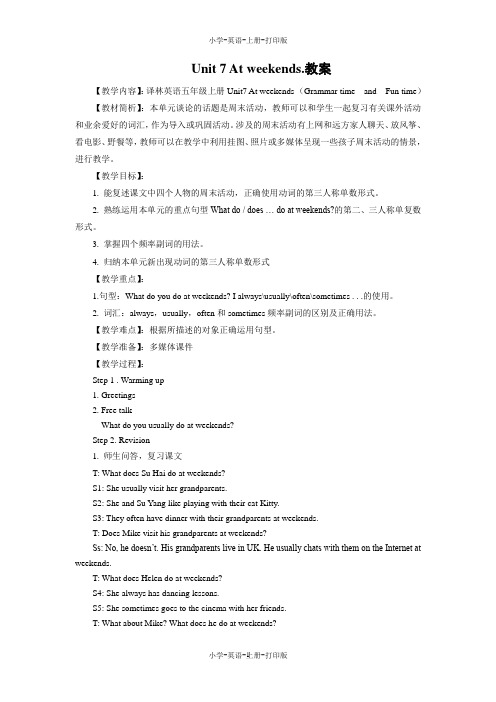
Unit 7 At weekends.教案【教学内容】:译林英语五年级上册Unit7 At weekends (Grammar time and Fun time)【教材简析】:本单元谈论的话题是周末活动,教师可以和学生一起复习有关课外活动和业余爱好的词汇,作为导入或巩固活动。
涉及的周末活动有上网和远方家人聊天、放风筝、看电影、野餐等,教师可以在教学中利用挂图、照片或多媒体呈现一些孩子周末活动的情景,进行教学。
【教学目标】:1. 能复述课文中四个人物的周末活动,正确使用动词的第三人称单数形式。
2. 熟练运用本单元的重点句型What do / does … do at weekends?的第二、三人称单复数形式。
3. 掌握四个频率副词的用法。
4. 归纳本单元新出现动词的第三人称单数形式【教学重点】:1.句型:What do you do at weekends? I always\usually\often\sometimes . . .的使用。
2. 词汇:always,usually,often和sometimes频率副词的区别及正确用法。
【教学难点】:根据所描述的对象正确运用句型。
【教学准备】:多媒体课件【教学过程】:Step 1 . Warming up1. Greetings2. Free talkWhat do you usually do at weekends?Step 2. Revision1. 师生问答,复习课文T: What does Su Hai do at weekends?S1: She usually visit her grandparents.S2: She and Su Yang like playing with their cat Kitty.S3: They often have dinner with their grandparents at weekends.T: Does Mike visit his grandparents at weekends?Ss: No, he doesn’t. His grandparents live in UK. He usually chats with them on the Internet at weekends.T: What does Helen do at weekends?S4: She always has dancing lessons.S5: She sometimes goes to the cinema with her friends.T: What about Mike? What does he do at weekends?S6: He usually plays football with Liu Tao.S7: He sometimes goes to the park with his family.S8: They usually fly a kite and have a picnic there.2. 复述课文中四个人物的周末活动。
精品教案译林版五年级英语上册u7 at weekends

5A Unit 7 At weekends第一课时教学内容:Story time教学目标:1. 能听懂、会说、会读、会写1)词汇:visit, often, always, sometimes, there2) 句型与日常用语:What do you do at weekends?I always / usually / often / sometimes …2. 能听懂、会说、会读1)词汇:At weekends, grandparent, play with, very much, chat, Internet,go to the cinema 2)句子:I usually visit my grandparents.Su Yang and I like playing with their cat Kitty very much.I usually chat with them on the Internet at weekends.She sometimes goes to the cinema with her friends.3. 能听懂、会说、会读本单元所学的一些周末活动的词汇4. 能正确运用、区分频率副词。
教学重点:·句型:What do you do at weekends? I always / usually / often / sometimes …·词汇:chat, cinema, grandparent, Internet, visit, often, always, sometimes教学难点:·句型:What do you do at weekends? I always / usually / often / sometimes …使用·词汇:always, usually, often和sometimes频率副词的区分及正确用法。
五年级上册英语教案Unit7Atweekends第二课时译林版

五年级上册英语教案 Unit 7 At weekends 第二课时译林版一、教学目标1. 让学生掌握本课时涉及的词汇和句型,如:often、always、sometimes 等。
2. 培养学生运用所学词汇和句型描述周末活动的交际能力。
3. 培养学生合作学习的能力,提高学生的团队协作意识。
4. 培养学生热爱生活、珍惜时光的情感态度。
二、教学内容1. 词汇:often、always、sometimes、go to the park、go shopping、visit grandparents等。
2. 句型:-What do you do on weekends? -I often/always/sometimes…三、教学重点与难点1. 教学重点:掌握词汇和句型,能运用所学知识描述周末活动。
2. 教学难点:正确运用often、always、sometimes等频度副词描述活动。
四、教具与学具准备1. 教具:多媒体课件、图片、卡片等。
2. 学具:课本、练习本、彩笔等。
五、教学过程1. 导入:通过歌曲或游戏导入,激发学生学习兴趣。
2. 新课呈现:借助图片、卡片等教具,引导学生学习词汇和句型。
3. 操练:设计各种活动,如角色扮演、小组讨论等,让学生巩固所学知识。
4. 应用:布置任务,让学生运用所学知识进行实际操作,如调查同学周末活动、编写对话等。
5. 总结与作业布置:对本节课内容进行总结,布置课后作业。
六、板书设计1. Unit 7 At weekends2. 词汇:often、always、sometimes、go to the park、go shopping、visit grandparents等。
3. 句型:-What do you do on weekends? -I often/always/sometimes…七、作业设计1. 抄写本课时词汇和句型。
2. 编写一段对话,描述自己和家人的周末活动。
Unit 7 At weekends 说课稿(第一课时)-五年级英语上册同步备课 译林版(三起)

Unit 7 At weekends 说课稿(第一课时)1.教学内容本课时的教学内容是《Unit 7 At weekends》的第一课时,本课时的学习重点在于教学生如何询问和回答他人在周末所做的事情,并谈论周末的活动。
2.教学目标•语言知识目标:–能够听懂并理解日常生活中简单的询问和回答。
–能够运用下列短语和句子进行交流:•What do you do at weekends?•I watch TV.•I play computer games.–能够理解并使用新词汇:weekend, watch, TV, play, computer games。
•情感态度价值观目标:–通过谈论周末活动,培养学生的表达能力和交流能力。
–激发学生对于休息生活的感受和热爱,建立积极健康的生活态度。
3.教学重点和难点重点:•表达询问和回答周末的活动。
•学习并掌握新词汇:weekend, watch, TV, play, computer games。
难点:•通过问答方式,让学生掌握熟练的日常用语。
•掌握年龄段学生常见的周末活动,让学生能够自如地表达出来。
4.教学方法和学法教学方法:•情境法•游戏活动法•任务型活动法学法:•听、说、读5.教学过程教师可以通过下面的教学流程,完成本课时的教学。
5.1.导入本课的导入,教师可以通过提问的方式,让学生回答自己在周末都会做什么。
5.2.新课讲解教师可以通过图片、视频等方式,先向学生简单介绍新词汇:weekend, watch, TV, play, computer games。
5.3.操练教师可以让学生在小组内进行问答练习,相互询问和回答自己在周末都会做什么,以此来加深学生的印象。
5.4.前后呼应教师可以引导学生回顾前面学过的有关询问、告知、道歉等句型,以让学生学以致用,培养出实际语言能力。
5.5.总结最后,教师可以让学生回答如下问题来对本课时的内容进行总结:•What did you learn today?•What can you say about weekend activities now?6.教学设计本课时的教学设计为以任务性为驱动的设计,主要包括以下几步:1.学生讨论周末活动的范畴,并列出常见的活动,以此帮助学生熟悉周末活动的范畴。
五年级上册英语教案-Unit7 At weekends Sound time |译林版(三起)
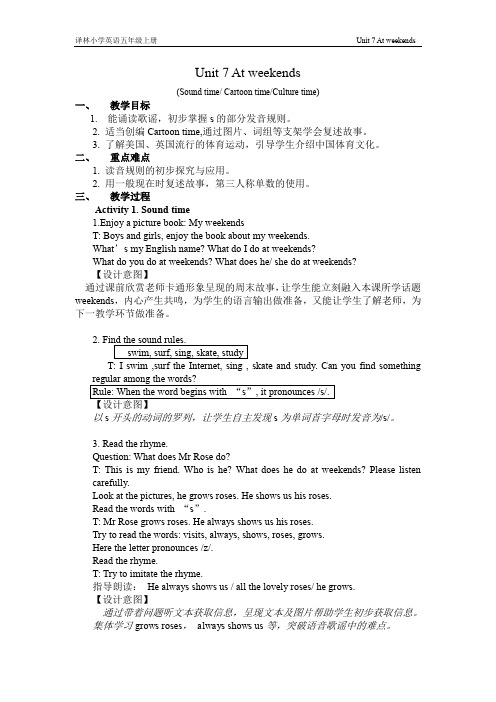
Unit 7 At weekends(Sound time/ Cartoon time/Culture time)一、教学目标1. 能诵读歌谣,初步掌握s的部分发音规则。
2. 适当创编Cartoon time,通过图片、词组等支架学会复述故事。
3. 了解美国、英国流行的体育运动,引导学生介绍中国体育文化。
二、重点难点1. 读音规则的初步探究与应用。
2. 用一般现在时复述故事,第三人称单数的使用。
三、教学过程Activity 1. Sound time1.Enjoy a picture book: My weekendsT: Boys and girls, enjoy the book about my weekends.What’s my English name? What do I do at weekends?What do you do at weekends? What does he/ she do at weekends?【设计意图】通过课前欣赏老师卡通形象呈现的周末故事,让学生能立刻融入本课所学话题weekends,内心产生共鸣,为学生的语言输出做准备,又能让学生了解老师,为下一教学环节做准备。
2. Find the sound rules.swim, surf, sing, skate, studyT: I swim ,surf the Internet, sing , skate and study. Can you find something regular among the words?Rule: When the word begins with “s”, it pronounces /s/.【设计意图】以s开头的动词的罗列,让学生自主发现s为单词首字母时发音为/s/。
3. Read the rhyme.Question: What does Mr Rose do?T: This is my friend. Who is he? What does he do at weekends? Please listen carefully.Look at the pictures, he grows roses. He shows us his roses.Read the words with “s”.T: Mr Rose grows roses. He always shows us his roses.Try to read the words: visits, always, shows, roses, grows.Here the letter pronounces /z/.Read the rhyme.T: Try to imitate the rhyme.指导朗读:He always shows us / all the lovely roses/ he grows.【设计意图】通过带着问题听文本获取信息,呈现文本及图片帮助学生初步获取信息。
- 1、下载文档前请自行甄别文档内容的完整性,平台不提供额外的编辑、内容补充、找答案等附加服务。
- 2、"仅部分预览"的文档,不可在线预览部分如存在完整性等问题,可反馈申请退款(可完整预览的文档不适用该条件!)。
- 3、如文档侵犯您的权益,请联系客服反馈,我们会尽快为您处理(人工客服工作时间:9:00-18:30)。
Unit7 At weekends第一课时教学目标1. Learn vocabulary: weekends, chat on the Internet, fly a kite, go to the cinema, have a picnic, sometimes, with, often, visit, grandparents.2. Learn the patterns: What do/does… at weekends? …..3. Train Ss feel the different activities at different people’s weekends. 教学重点难点1. Learn vocabulary: weekends, chat on the Internet, fly a kite, go to the cinema, have a picnic, sometimes, with, often, visit, grandparents.2. Learn the patterns: What do/does… at weekends? …..教学方法情境教学法教学步骤教师活动学生活动S tep1 Warming-upG reetings and free talk. G reetings and free talk.L isten and write some words and sentences. L isten and write some words and sentences.C heck the answers. C heck the answers.S tep2 PresentationT: Look at the pictures, who are they? P lease guess. S: Mike, Helen, Su Hai and Su Yang.T: What are they talking about? P lease watch the cartoon. Watch the cartoon.Teach the new words: weekends, chat on the Internet, fly a kite, go to the cinema, have a picnic, sometimes, with, often, visit, grandparents Learn the new words.A sk, answer and fill the forms. A sk, answer and fill.Su Hai and Su Yang-visit grandparents, play with the cat Kitty, have dinner with grandparents Mike-chat with grandparents on the Internet, playfootball with Liu Tao, go to the park with his family, fly a kite, have a picnic Helen-has dancing lessons, go to the cinema with her friends Teach: What do/does … at weekends? L earn: What do/does … at weekends?R ead the new vocabulary. R ead the new vocabulary.L isten to the tape and notice the pronunciation s and intonation s.L isten to the tape and notice.R ead after the tape. R ead after the tape.T ry to read this story. T ry to read this story.Choose one kind of reading and read in groups. Choose one kind of reading and read in groups.T ry to read this story. T ry to read this story.R ead this story together. R ead this story together.A ct this story. Act this story.R ead in roles. R ead in roles.S tep3 ConsolidationMake some dialogues: What do/does XX do at weekends? XX …/s/es ….Make some dialogues: What do/does XX do at weekends? XX …/s/es …. S tep4 Homework1. Write the new vocabulary.2. Read, recite and act this story.板书设计Unit7 At weekendsSu Hai and Su Yang- visit grandparents, play with the cat Kitty, have dinner with grandparentsMike-chat with grandparents on the Internet, play football with Liu Tao, go to the park with his family, fly a kite, have a picnicHelen-has dancing lessons, go to the cinema with her friends课前准备cards, pictures, tape, recorder课后小结Unit7 At weekends第二课时教学目标1. Learn the vocabulary: fly-flies, go-goes2.Learn the patterns: What do/does XX do at weekends? XX sometimes/often …/s/es ….3. Learn the third person singular in the sentences.教学重点难点1.Learn the patterns: What do/does XX do at weekends? XX sometimes/often …/s/es ….2. Learn the third person singular in the sentences.教学方法操练教学法教学步骤教师活动学生活动S tep1 Warming-upG reetings and free talk. G reetings and free talk.L isten and write some words L isten and write.C heck the answers. C heck the answers.R ead and act this story. R ead and act this story.S tep2 PresentationL ook at the pictures. L ook at the pictures.Talk about the pictures and the sentences. Talk about the pictures and the sentences.L ook and write. L ook and write.Check the answers: Check the answers.I usually play football with Liu Tao at weekends. I also chat with my grandparent on the Internet. I sometimes fly a kite and have a picnic with my family.Su Yang and I usually visit our grandparents at weekends. W e play with their cat Kitty. W e have dinner with our grandparents.I always have dancing lessons at weekends. I sometimes go to the cinema with my friends.R ead and write the sentences. R ead and write.R ead the sentences. R ead the sentences.T each the new words :goes, flies L earn the new words.T each the third person singular in the sentences. L earn the third person singular in the sentences.C omplete the grammar. C omplete the grammar.Teach the different words: always, usually, often, sometimes L earn the different words: always, usually, often, sometimesL ook at the pictures and talk about the pictures and the sentences.L ook at pictures and talk about them and sentences.P lay a game “Ask and answer”P lay a game.C heck the answers. C heck the answers.S tep3 ConsolidationR ead and write the sentences. R ead and write.Make some dialogues: What do/does XX do at weekends? …. Make some dialogues.Make some sentences with the third person singular. Make some sentences with the third person singular.S tep4 Homework1. Copy and write some sentences..2. Describe the activities of the weekends.板书设计Unit7 At weekendsWhat do you do at weekends? I….they T heydoes he He …s/es ….she She …s/es ….fly-flies go-goes课前准备cards, pictures, tape, recorder课后小结Unit7 At weekends第三课时教学目标1. Learn the vocabulary: rose, grow, get out.2. Learn the phonetic of the letter “s”.3. Learn the patterns: Let’s go …. He/She ……s/es ….4. Train Ss enjoy the great fun of this cartoon story. 教学重点难点1. Learn the vocabulary: rose, grow, get out.2. Learn the phonetic of the letter “s”.3. Learn the patterns: Let’s go …. He/She ……s/es …. 教学方法谈话教学法教学步骤教师活动学生活动S tep1 Warming-upG reetings and free talk. G reetings and free talk.L isten and write some sentences. L isten and write.C heck the answers. C heck the answers.S tep2 PresentationL ook at the pictures. L ook at the pictures.L isten to the tape. L isten to the tape.F ind the same letter “s”. F ind the same letter “s”.S ay the phonetic /z/ of the letter “s”. S ay the phonetic /z/.T each the new words: rose-roses, grow-grows L earn the new words: rose-roses, grow-growsR ead the short text. R ead the short text.A ct the short text. A ct the short text.F ind the other words. F ind the other words.D o some exercises. D o some exercises.Check the answers: Check the answers.T: L ook at the pictures, who are they? S: They’re Billy, Sam and Bobby.T: What are they doing? Watch the cartoon, please. Watch the cartoon.A sk, answer and fill the forms: A sk, answer and fill.Billy-watch TV, eat a lot, don’t like playing basketball and swimming, can’t get outSam and Bobby-play basketball, go swimming, go and have a picnicL isten to the tape and notice the pronunciation s and intonation s.L isten to the tape and notice.Teach the new word: get out L earn new word.R ead after the tape. R ead after the tape.Choose one kind of reading and read in groups.Choose one kind of reading and read in groups.R ead th is cartoon story together. R ead th is cartoon together.Act this cartoon story. Act this cartoon story.T each the learning tip. L earn the tip.T: What about this cartoon story? S: ….S tep3 ConsolidationMake some sentences with the third person singular. Make some sentences with the third person singular.S tep4 Homework1. Write some vocabulary and patterns.2. Read, recite and act this cartoon story.板书设计Unit7 At weekendsrose-roses grow-grows get outw-/w/Let’s go …. H e/She …s/es ….课前准备cards, pictures, tape, recorder课后小结Unit7 At weekends第四课时教学目标1. Learn the vocabulary: popular.2. Learn the different ball cultures in different countries.3. Review the vocabulary and patterns of this unit.4. Appraise the harvest of this unit.教学重点难点1. Learn the vocabulary: popular.2. Learn the different ball cultures in different countries.3. Review the vocabulary and patterns of this unit.教学方法复习教学法教学步骤教师活动学生活动S tep1 Warming-upG reetings and free talk. G reetings and free talk.D o some exercises of the letter “s”. D o some exercises.C heck the answers. C heck the answers.S tep2 PresentationL ook at the pictures. L ook at the pictures.T alk about the pictures. T alk about the pictures.L isten to the tape. L isten to the tape.T each the new words: popular L earn the new words: popularR ead the short text. R ead the short text.A ct the short text. A ct the short text.T each the different ball cultures in different countries. Learn the different ball cultures in different countries.L ook at the pictures. L ook at the pictures.T alk about the pictures and sentences. T alk about the pictures and sentences.Ask, choose and say. Ask, choose and say.C heck the answers. C heck the answers.L ook at the pictures. L ook at the pictures.T alk about the pictures and sentences. T alk about the pictures and sentences.Think and write. Think and write.Check the answers: Check the answers.I usually do homework at weekends. I often play football. I sometimes watch TV. My friend XX always does homework at weekends. H e/She usually has skating lessons. He/She sometimes goes to the cinema.R ead and write the sentences. R ead and write.R eview this unit. R eview this unit.S ay the rules of it. S ay the rules of it.A ppraise the harvest of this unit. A ppraise the harvest.T otal the stars. T otal the stars.S tep3 ConsolidationMake some dialogues: This is my friend. H e/She ……s/es …. Make some dialoguesS tep4 Homework1. Recite the vocabulary and patterns.2. Finish the workbooks.板书设计Unit7 At weekendsB asketball is popular in the US.F ootball is popular in the UK.Table tennis is popular in China.课前准备cards, pictures, tape, recorder课后小结。
